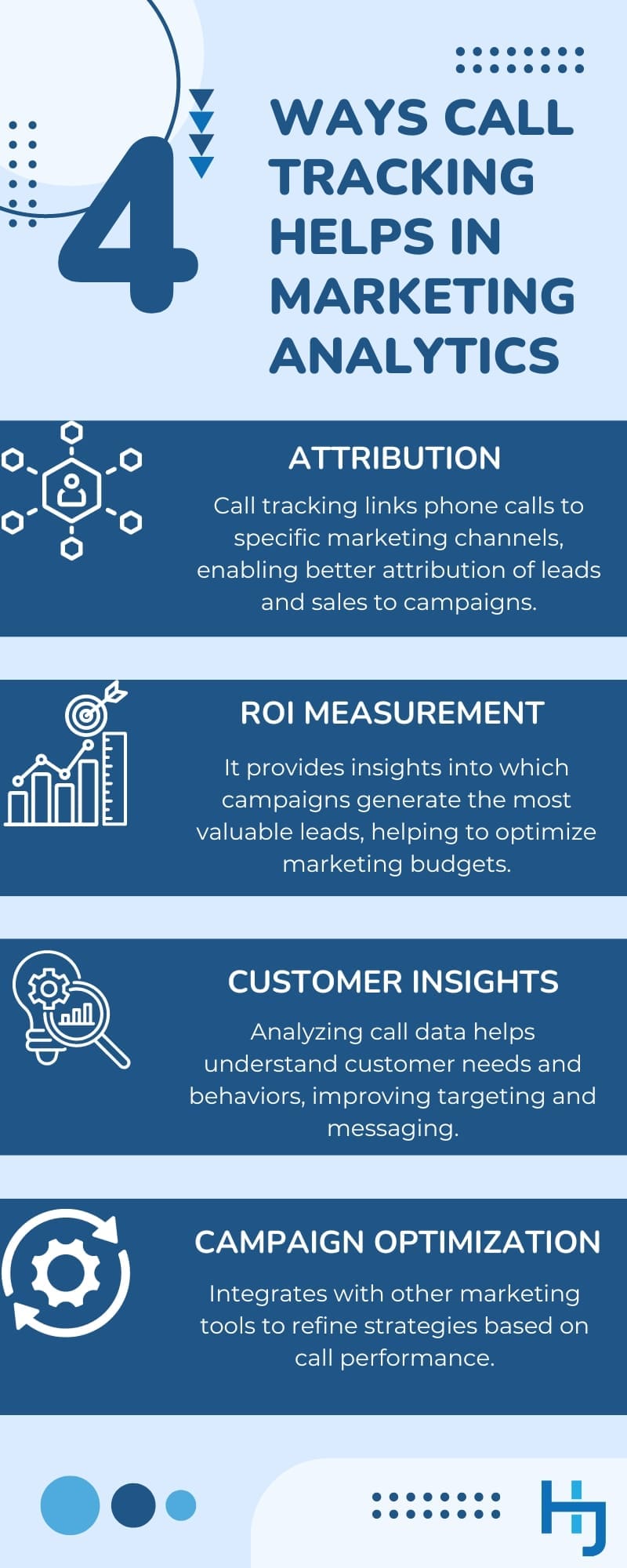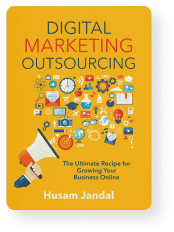![]() Is call tracking yet another useless ‘bell and whistle’ companies are incorporating, or is there something to the recent trend? If your business is engaging in any kind of digital marketing, it may actually be one of the smartest technologies you employ. Give me five minutes, and I’ll show you how call tracking works, plus explain how your business can benefit from it.
Is call tracking yet another useless ‘bell and whistle’ companies are incorporating, or is there something to the recent trend? If your business is engaging in any kind of digital marketing, it may actually be one of the smartest technologies you employ. Give me five minutes, and I’ll show you how call tracking works, plus explain how your business can benefit from it.
The Importance of Marketing Analytics
I often talk about how to measure your marketing success because it’s a crucial component in the overall success of your business. When you know what metrics to track and have the right insights, you can:
- Know if you’re getting ROI from your marketing efforts.
- Improve the effectiveness of your marketing campaigns over time.
- Redirect resources to marketing strategies that are generating the most ROI.
- Optimize your marketing budget.
- And so much more.
Best of all, you can often get the insights you need from a free platform like Google Analytics to start, so it’s one of the easiest things to implement even if you’re on a budget.
How Call Tracking Helps in Marketing Analytics
![]()
No matter what industry you’re in, chances are your business receives phone calls of some sort. Even online-only businesses typically include a phone number to help smooth the conversion process for prospects who prefer a human voice and live assistance. That adds up. Calls to businesses from mobile devices alone have grown more than 110 percent since 2014, according to BIA.
The thing is, all those calls can come from different sources. You may have inbound phone calls triggered by your Google ads, organic search, social media, offline sources such as radio or billboards, and more. Plus, the channel someone starts on may not be the channel that converts them.
It’s difficult to tell the flow apart without some help, but telling where your calls come from is simple if you give each source a unique phone number. Likewise, serving a visitor a unique number on your website and various landing pages is equally easy. In some low-tech situations, you simply manually add the unique phone number to the pages of your choosing. For more dynamic marketing, you can use a specialized program to change out the phone number depending on how someone arrives on the page. This is generally done by adding a plugin or single line of code.
On the back end, all your local and toll-free numbers will forward to your primary phone number, so you don’t need to change anything about the way you operate or how your phone calls are handled unless you want to. Data about each caller is captured by specialized call tracking software to help guide your decision-making process too.
Other Benefits of Call Tracking

Call tracking software is always capturing data in the background, which you can use in a variety of ways to benefit your business and marketing.
Call Analytics
Call conversions are one metric often found as part of an analytics suite, as is call duration. The call length can tell you quite a bit. For example, an average call time of five minutes may suggest that you’re getting quality leads, particularly if you have solid conversion rates too. However, if your agents are staying on the phone for more than ten minutes or so, it could signify that you need to give prospects more information on your website and other marketing channels.
Call Monitoring
Call monitoring makes it easy to get to the bottom of something when a customer has an issue and can also serve as a valuable training tool. For example, if there are disparities in conversion rates between reps, it’s likely how they’re handling calls. So you can listen to their calls to see what’s happening and coach them. You can also listen to calls from high-performing reps to see what they’re doing differently and share the info.
Call Routing
Advertisers appreciate the option to route inbound calls to the best agent for the caller’s needs. You can route by medium, send people who saw a specific ad to certain reps, and more.
Common Features of Call Tracking Software
Let’s say, for example, you’re not using any kind of call tracking platform, and a prospect calls your sales line. Your rep dutifully asks the prospect how they heard about your business, and the prospect says they ran an online search. Great! You’ve got the data you need! Not so fast.
Chances are, your prospects don’t know what they click on or search. It could be organic search, Google AdWords campaigns, or even call extensions within them. Call tracking software breaks it down even more for you so you can tell which click made the difference.
Campaign-Level Tracking
Campaign-level tracking can provide insights into both your online and offline marketing campaigns. For example, you may have one number for your billboards, another number for your radio ads, and a third phone number for your PPC campaign. Therefore, it gives a high-level overview rather than a granular one.
Keyword-Level Tracking
Chances are, you’re using lots of keywords in your PPC ads. Some advanced call tracking platforms are capable of keyword-level tracking, which would display a unique number to each user to track the keywords that resulted in phone calls. In addition to keywords, this method allows tracking other important call source details, such as the search engine, landing page, ad campaign, and ad group.
If you’re using Google Analytics for attribution and conversion tracking, you’ll see the campaign and the keyword, so you’ll get a clearer picture of what’s driving your calls and conversions.
Multi-Channel Attribution Tracking
One of the endless challenges of marketing attribution is that a “typical” customer rarely makes a purchase the first time they interact with your brand. When someone is searching for a t-shirt, they have 1.7 touchpoints with the brand they buy from before the sale per Google research. If they’re buying a laptop, it jumps to 3.4 touchpoints. With something like travel, a consumer may run hundreds of searches in the months preceding the event, the search engine says. That can easily lead to dozens of touchpoints too.
At the same time, a traditional analytics program will likely only look at one touchpoint. That means someone who clicked on a PPC ad, then found you organically later, and then engaged with you on social media may only be logged as a PPC conversion.
How Call Tracking Helps Marketing Agencies
Marketing agencies and consultants often use call tracking programs too. It helps us identify campaigns that are performing better than others, so we move more of the marketing budget to the areas working best. That’s important for the sake of identifying which channels produce phone calls and which strategy produces the highest number of conversions or most cost-effective conversions.
If you’re using a CRM or marketing automation platform like Salesforce or HubSpot, your marketing professional may be able to link your call tracking software up with it to keep all your customer data in one place and leverage incredibly targeted campaigns.
Why Your Business Should Invest in Call Tracking Software for Marketing Analytics
At the end of the day, call tracking software arms your company with data it wouldn’t otherwise have to make informed decisions. That means you can gain a lot of ground by cutting out unnecessary spend and increase your conversions dramatically.
Get Help Bringing Your Marketing, Sales, and Business into Alignment
As a business and digital marketing consultant, I help small and midsize businesses level up by bringing in the right resources and strategies for their needs. Oftentimes, this involves leveraging tools like call tracking software. If you’re interested in exploring business growth options for your business, contact me for a complimentary consultation.




































































